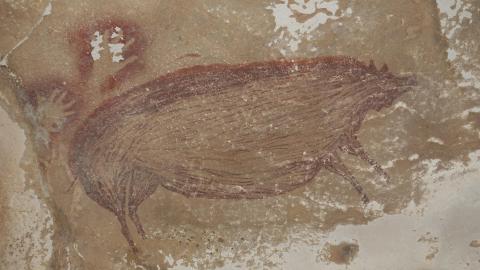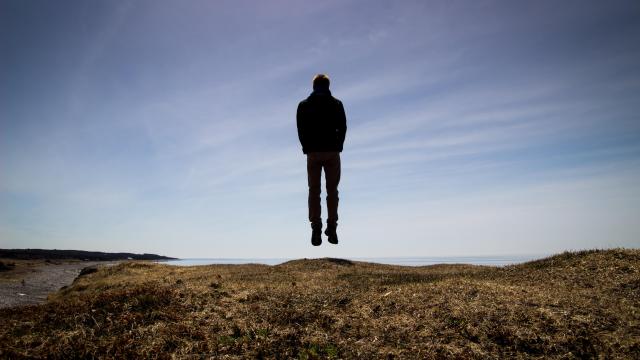World’s oldest work of art found in a hidden Indonesian valley

Credit: Maxime Aubert
- Archaeologists find a cave painting of a wild pig that is at least 45,500 years old.
- The painting is the earliest known work of representational art.
- The discovery was made in a remote valley on the Indonesian island of Sulawesi.
A recently-found picture of a wild pig that was made over 45,500 years ago is the world’s oldest known cave painting, according to archaeologists. The painting, which may also be the world’s oldest representational or figurative artwork, was discovered on the island of Sulawesi in Indonesia, hidden away in a remote Leang Tedongnge cave.
If you’re wondering, the now-second world’s oldest dated painting of 43,900 years of age was previously found in the same Sulawesi area by the same team. That one pictured a group of part-human, part-animal hybrid figures on the hunt. The scientists also point out that these dates are minimum ages, determined from analyzing buildups of mineral deposits on the cave art. The paintings could be as old as 60,000 to 65,000 years. By comparison, the cave paintings in the Lascaux cave complex in France are “just” 17,000 years old.
The discovery was made inside the Leang Tedongnge cave by the archaeologist Basran Burhan, a doctoral student and co-author of the study. He’s part of a team which involves researchers from Griffith University in Australia and Indonesia’s leading archaeological research centre, Pusat Penelitian Arkeologi Nasional (ARKENAS).
“Humans have hunted Sulawesi warty pigs for tens of thousands of years,” said Burhan, adding “These pigs were the most commonly portrayed animal in the ice age rock art of the island, suggesting they have long been valued both as food and a focus of creative thinking and artistic expression”.
The Sulawesi warty pig was painted using dark red ochre pigment and is about 53 by 21 inches in size. It features some upright hair and horn-like warts on the face that the adults of this species are known for. Another two partially-preserved pigs face the main animal.
Oldest Cave Art Found in Sulawesiwww.youtube.com
Two hand prints, most probably left by Homo sapiens rather than other human ancestors like the Denisovans, can be seen by the pig’s hindquarters. The scientists are looking to extract DNA samples from the prints.
The cave with the painting is in a valley of limestone cliffs, an hour’s walk away from any road. You can only access it during dry season because of flooding during the rainy season. Previously it was only known to members of the isolated Bugis community.
The site has the oldest evidence of human presence on the islands of Indonesia, known as “Wallacea,” and is likely linked to the group of people who were migrating to Australia.
Read the new study in Science Advances.





